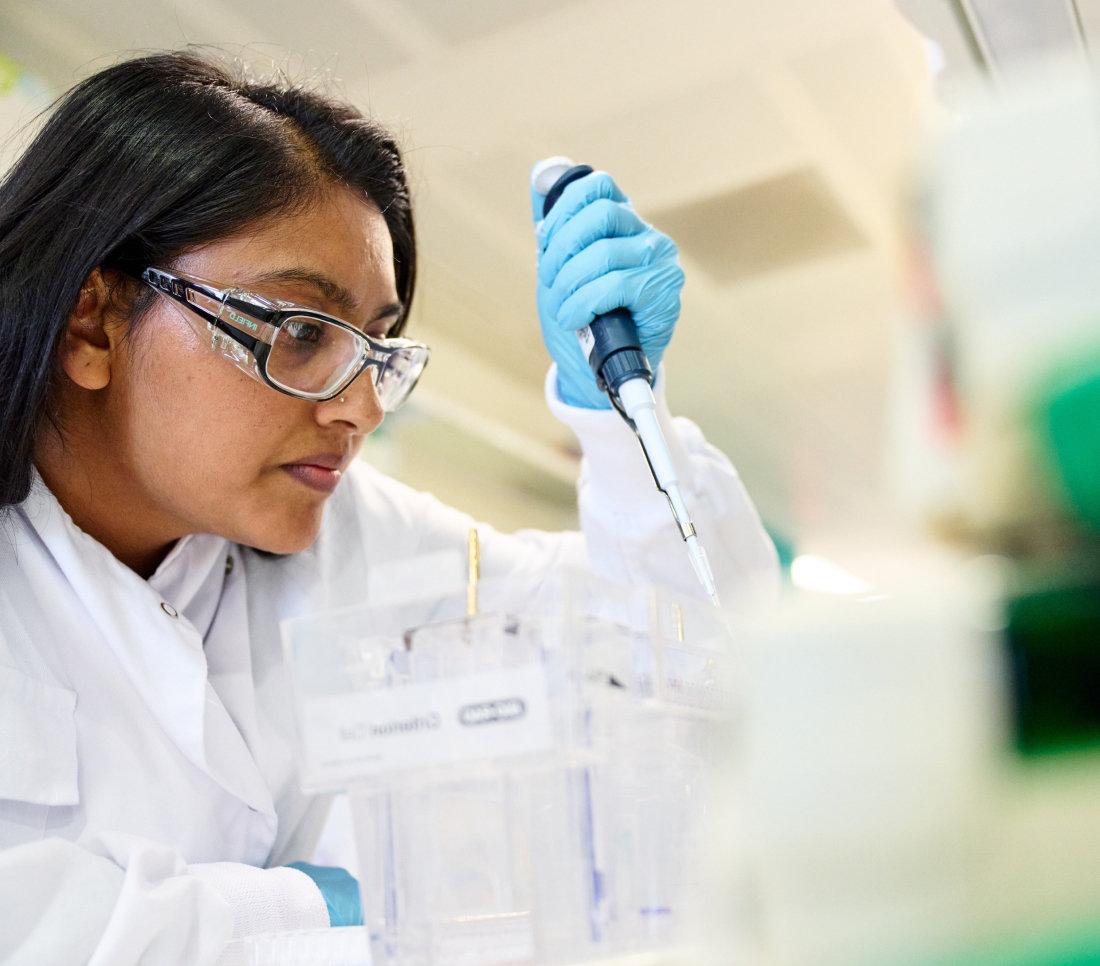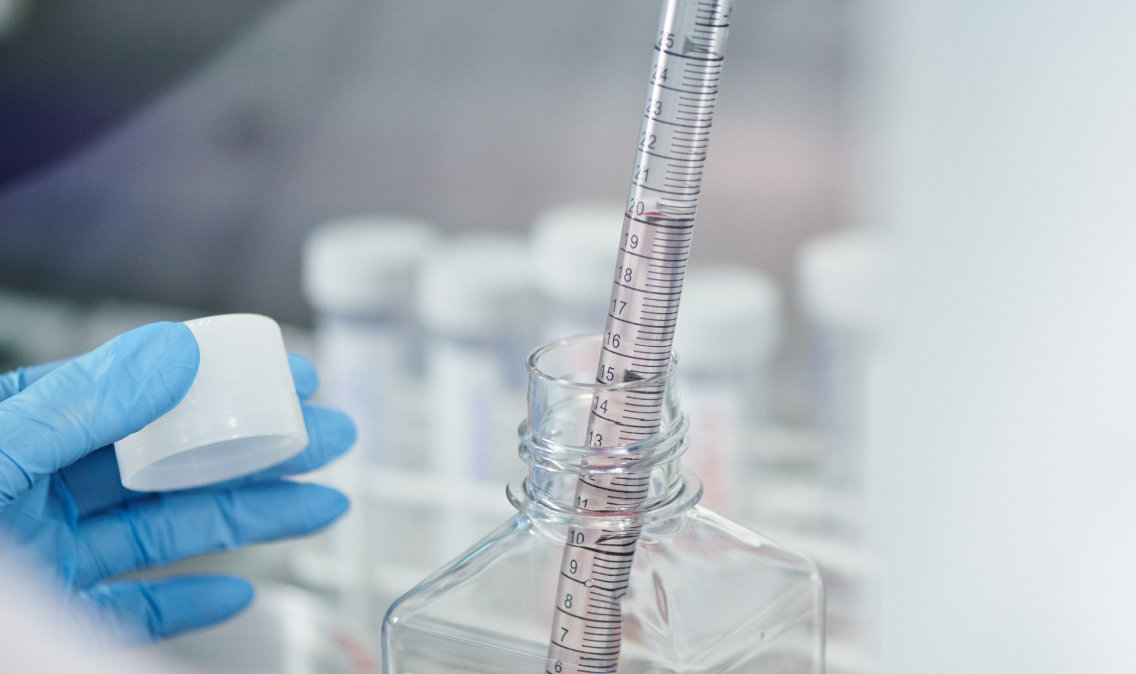Progressing innovative therapeutics
Cancer Research Horizons operates along the entire continuum of drug development, augmenting cutting-edge technology platforms, research alliances, collaborations, and providing access to a network of 200 drug discovery researchers as well as clinical trial networks that span the UK. Three new international alliances, and a clinical trial milestone are among this year’s highlights.
Continue

The Therapeutic Innovation Strategy
in brief
Cancer Research Horizons’ mission is to bring together the brightest minds, boldest ideas and best partners to fast-track scientific breakthroughs into cancer patient benefit.
Our Therapeutic Innovation division, a new translational engine comprising 200 drug discovery scientists across six sites, was created to deliver a step-change in patient impact. We plan to achieve this through reconfiguring our organisation and how we work to fully capitalise on our unique bridging position between academia and the commercial world.
We plan to engage earlier and more broadly with breakthrough science, seeking to apply our translational insight to bring more high-quality projects into our portfolio. We will focus on selected priority areas of scientific focus that will form the basis for the bulk of our portfolio build, but are also open to evaluate and support all ideas that may be translated to significant patient benefit. We will refocus our resource and technology development to emphasise cutting-edge target validation and feasibility, and selected capabilities in early drug discovery to enable scaling and agile progression of a highly novel portfolio.
This combination of network engagement, selective focus, and drug discovery capabilities, which other organisations cannot replicate, will drive the identification of novel targets and the efficient generation of early hit matter. Our differentiated drug discovery proposition will foster partnerships and investment from industry, and attract venture capital, philanthropy and the interest from other charities necessary for advancing our portfolio through mid- and late-stage drug discovery at pace. We have set the bold and aspirational ambition of doubling the patient benefit output of our predecessor organisations, measured by the surrogate of new therapies entering clinical trials.
International partnerships
Cancer is a global problem, which needs to be tackled by a worldwide community. Recognising the importance of this within the discovery and development of new therapeutics, we have initiated three new international partnerships within the past 18 months, with translationally focused cancer centres. These comprise the Oncode Institute (Netherlands), the Karolinska Institutet (Sweden) and the Experimental Drug Discovery Centre (Singapore).
Each partnership brings unique and synergistic insights and expertise to complement the capabilities of our drug discovery scientists and help to accelerate therapeutic discovery. We are excited to be partnering with these world-leading research and translational networks who share our vision to go further, faster, together, to beat cancer.

Oncode Institute

Karolinska Institutet

Experimental Drug Development Centre

Deep Science Ventures
During the past year we began a new partnership with Deep Science Ventures to explore cocreation of innovative startup companies incubated within Cancer Research Horizons’ Therapeutic Innovation Laboratories. This partnership builds on an existing collaboration with Deep Science Ventures, which led to the formation of three new cancer therapeutic companies.
The approach starts by examining some of the biggest problems within cancer treatment and designing focused solutions from an early stage using scientific knowledge from across the Cancer Research Horizons and Deep Science Ventures networks. Once we have identified a discrete area for venture building, we recruit founders-in-residence with an entrepreneurial character and relevant expertise around the area of interest to develop a new therapeutic concept, and work with Deep Science Ventures and Cancer Research Horizons’ drug discovery team towards establishing a company and proof-of-concept data.
Within the new alliance, Deep Science Ventures and Cancer Research Horizons have already identified their first joint venture. We are developing a multi-pronged therapy to reprogramme the phenotype of problematic cells in the tumour microenvironment, in vivo. Our technology will not only revert the immuno-suppressive phenotype, but will also create the environment for immune-mediated tumour elimination. The expert team at Cancer Research Horizons will support the future venture with lab space and in-kind wet lab resource. Deep Science Ventures has recruited two founder analysts, Elisa Arthofer and Loïc Roux, to lead the development of this opportunity. These founders will benefit from the expertise within Cancer Research Horizons and the wider Cancer Research UK network to help accelerate the opportunity.

Deep Science Ventures
During the past year we began a new partnership with Deep Science Ventures to explore cocreation of innovative startup companies incubated within Cancer Research Horizons’ Therapeutic Innovation Laboratories. This partnership builds on an existing collaboration with Deep Science Ventures, which led to the formation of three new cancer therapeutic companies.
Read more

The Cancer Research Horizons–AstraZeneca Functional Genomics Centre
The Functional Genomics Centre (FGC) was established in 2019 as a collaboration between AstraZeneca and Cancer Research Horizons to build a centre focused on developing and applying genetic screening in oncology. The FGC is developing novel CRISPR technologies to better understand cancer biology, creating biological models that may be more reflective of human disease and advancing computational approaches to improve analysis of big datasets. A main aim of the FGC is to enable access to these technologies for scientists and clinicians funded by Cancer Research UK. The FGC has nation-wide impact with a portfolio of 35 completed or active projects from 16 different institutes across the UK.
In 2022, the FGC created a joint three-year strategy to strengthen the partnership and give clarity to its future direction. Central to its strategy is the implementation of functional genomics capabilities that enable screening in more complex disease relevant models and better understanding of target biology and drug mode of action.
The FGC is currently focused on developing single-cell CRISPR (scRNA CRISPR) to derive more complex phenotypes, CRISPR activation to understand activating mutations and amplifications, combinational libraries to identify new synthetic lethal interactions, and mutation screening to better understand targets and drug mode of action.
“Working with the FGC has given us access to CRISPR screening capabilities that we would not have been able to replicate independently,” explains Dr Ivan Ahel, a collaborating Senior Wellcome Trust Research Fellow at the University of Oxford. “The team worked super efficiently and in a very collaborative way, and we had detailed and enjoyable scientific and technical discussions during the process.”

The FGC team.

Our Antibody Alliance Laboratory team with their Longstanding Alliance award.

Antibody Alliance Laboratory receives ASAP Excellence Award
The Antibody Alliance Laboratory, a joint facility between Cancer Research Horizons and AstraZeneca, combines our cancer biology expertise with the world-class antibody engineering technology of AstraZeneca.
The alliance gives us access to AstraZeneca’s internationally recognized antibody phage display libraries and connects Cancer Research UK’s large academic network with AstraZeneca’s biological expertise.
The Antibody Alliance Laboratory won the Longstanding Alliance award at the 2023 Alliance Excellence Awards, run by the Association of Strategic Alliance Partnerships. The award recognises partnerships that have sustained excellence over at least five years, usually having overcome challenges by adapting to evolving conditions.
Researchers can join our team of 20 drug discovery and antibody engineering scientists by working in this award-winning laboratory, whether they are funded by Cancer Research UK or not. Alongside our experts in antibody phage display and the expression of high-quality proteins, researchers can steer a project, co-author publications and patents, and bring new skills back to their labs.

Ian Hitchcock from the Antibody Alliance Laboratory talks about oncogenic driver mutations in myeloproliferative neoplasms.

